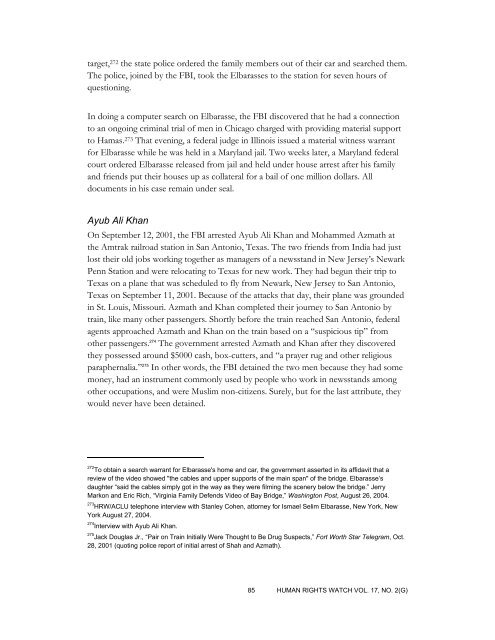Witness to Abuse - Human Rights Watch
Witness to Abuse - Human Rights Watch
Witness to Abuse - Human Rights Watch
Create successful ePaper yourself
Turn your PDF publications into a flip-book with our unique Google optimized e-Paper software.
target, 272 the state police ordered the family members out of their car and searched them.<br />
The police, joined by the FBI, <strong>to</strong>ok the Elbarasses <strong>to</strong> the station for seven hours of<br />
questioning.<br />
In doing a computer search on Elbarasse, the FBI discovered that he had a connection<br />
<strong>to</strong> an ongoing criminal trial of men in Chicago charged with providing material support<br />
<strong>to</strong> Hamas. 273 That evening, a federal judge in Illinois issued a material witness warrant<br />
for Elbarasse while he was held in a Maryland jail. Two weeks later, a Maryland federal<br />
court ordered Elbarasse released from jail and held under house arrest after his family<br />
and friends put their houses up as collateral for a bail of one million dollars. All<br />
documents in his case remain under seal.<br />
Ayub Ali Khan<br />
On September 12, 2001, the FBI arrested Ayub Ali Khan and Mohammed Azmath at<br />
the Amtrak railroad station in San An<strong>to</strong>nio, Texas. The two friends from India had just<br />
lost their old jobs working <strong>to</strong>gether as managers of a newsstand in New Jersey’s Newark<br />
Penn Station and were relocating <strong>to</strong> Texas for new work. They had begun their trip <strong>to</strong><br />
Texas on a plane that was scheduled <strong>to</strong> fly from Newark, New Jersey <strong>to</strong> San An<strong>to</strong>nio,<br />
Texas on September 11, 2001. Because of the attacks that day, their plane was grounded<br />
in St. Louis, Missouri. Azmath and Khan completed their journey <strong>to</strong> San An<strong>to</strong>nio by<br />
train, like many other passengers. Shortly before the train reached San An<strong>to</strong>nio, federal<br />
agents approached Azmath and Khan on the train based on a “suspicious tip” from<br />
other passengers. 274 The government arrested Azmath and Khan after they discovered<br />
they possessed around $5000 cash, box-cutters, and “a prayer rug and other religious<br />
paraphernalia.” 275 In other words, the FBI detained the two men because they had some<br />
money, had an instrument commonly used by people who work in newsstands among<br />
other occupations, and were Muslim non-citizens. Surely, but for the last attribute, they<br />
would never have been detained.<br />
272<br />
To obtain a search warrant for Elbarasse's home and car, the government asserted in its affidavit that a<br />
review of the video showed "the cables and upper supports of the main span" of the bridge. Elbarasse’s<br />
daughter “said the cables simply got in the way as they were filming the scenery below the bridge.” Jerry<br />
Markon and Eric Rich, “Virginia Family Defends Video of Bay Bridge,” Washing<strong>to</strong>n Post, August 26, 2004.<br />
273<br />
HRW/ACLU telephone interview with Stanley Cohen, at<strong>to</strong>rney for Ismael Selim Elbarasse, New York, New<br />
York August 27, 2004.<br />
274<br />
Interview with Ayub Ali Khan.<br />
275<br />
Jack Douglas Jr., “Pair on Train Initially Were Thought <strong>to</strong> Be Drug Suspects,” Fort Worth Star Telegram, Oct.<br />
28, 2001 (quoting police report of initial arrest of Shah and Azmath).<br />
85 HUMAN RIGHTS WATCH VOL. 17, NO. 2(G)
















